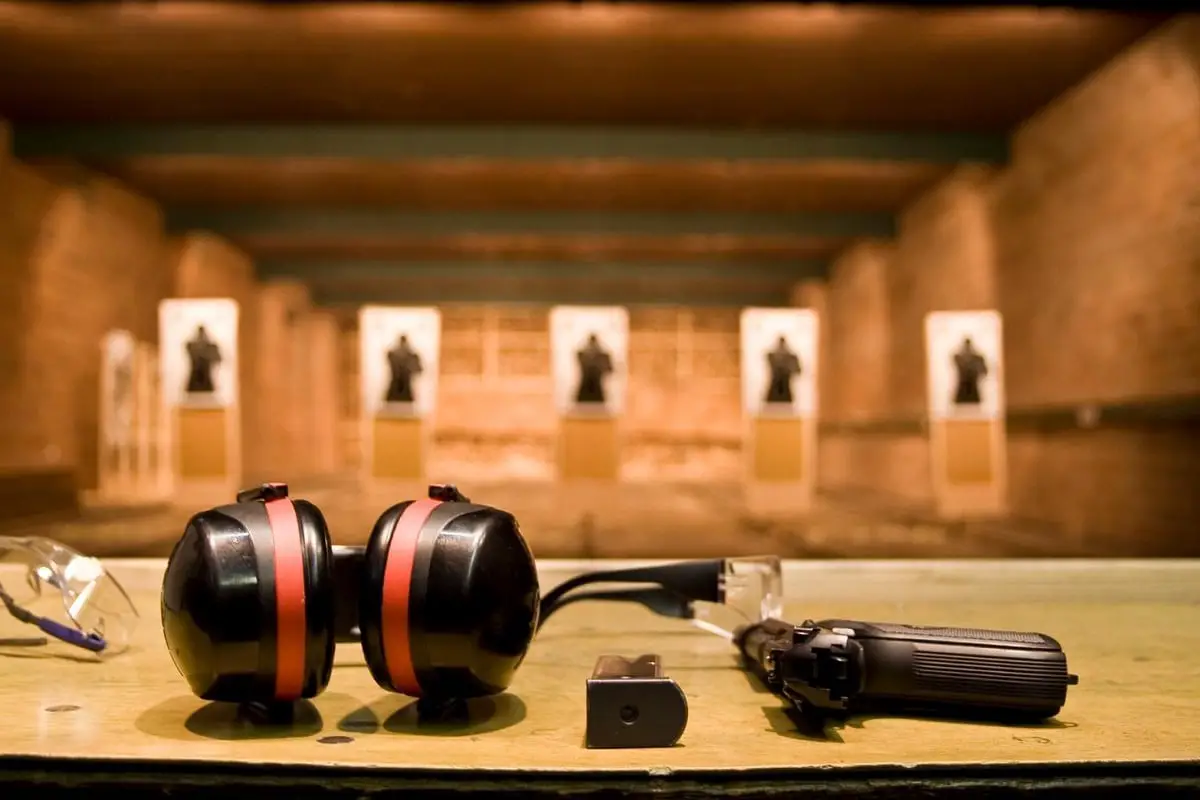Shooting glasses are special safety glasses that require certain performance capabilities. This means the materials they are made of are selected with care. This article discusses these.
Materials Used In Shooting Glasses
Shooting glasses are made to protect the eyes from debris, debris scatter, sunlight and to reduce or stop any sort of glare. It has become a necessity in every shooting range due to chance of severe accidents that occur when shooting rifles, handguns and shotguns.
Flying shell casings, bullet ricochet, wind particles that could blow into the eyes and affect the ability to concentrate and see the target. This is why special materials are chosen to make shooting glasses.
Variations in these materials depend on the brand and style, which include:
- Polycarbonate (lens material)
- Polycarbonate – TPR – thermoplastic rubber mix (frame material)
- TR90 thermoplastic material – transparent granular polymer (frame material)
- Metal – titanium, beta-titanium, beryllium, stainless steel, monel, aluminum, flexon (frame material)
- Rubber (nose peice material)
The frame, lenses, and nose peices are formed from injection molding.
Shooting Glasses Components
Different brands and styles of shooting glasses use the same basic components. These include:
- Frame
- Lenses
- Nose piece
Shooting Glasses Specs
Shooting glasses that you can purchase online will include variations of these specifications:
- Soft rubber nose piece (adjustable, non-slip, etc.)
- Anti-fog, anti-scratch, anti-glare (polarized), wrap-around polycarbonate lenses
- Semi-rimless, adjustable, flexible frame
- Rubber-tipped temples
- UV protection (UV400, etc.)
- Extra polycarbonate replacement lenses
- Additional cloth or plastic case
Why Use Polycarbonate For Shooting Glasses Lens Material?
The lenses of shooting glasses are made of special material, and for good reason. This is usually polycarbonate.

What Is Polycarbonate (PC)?
Polycarbonate, or PC, is a type of thermoplastic polymer that is very transparent and strong. It has glass-like qualities and is often used in eyewear, medical devices, automotive components, and other items that require impact resistant and smoothe surfaces.
Polycarbonate Chemical Formula
Polycarbonate’s chemical formula is C15H16O2.
Advantages of Polycarbonate Lenses
Polycarbonate lenses have many benefits, including:
- High durability
- High impact resistance
- Very good ultra violet (UV) protection – up to 100%
- Available in multiple colors
- High light transmission
- Water-resistant
- Flame and chemical resistant
- Lightweight
- Thin
Polycarbonate is very strong, easily passes light through, and offers very good UV protection. It will not shatter on most impacts, and is very lightweight. The lens material can also be thinner than glass lenses. These benefits make it preferable to glass or other plastics for shooting glasses lens material.
Polycarbonate Impact Resistance
Polycarbonate has very high impact resistance. In fact, it has better impact resistance than glass, acrylonitrile butadiene styrene (ABS) plastic, polystyrene (PS), or nylon. This is why lenses made of PC are able to pass ANSI Z87.1 as well as other high speed impact tests.
Polycarbonate Scratch Resistance
Although polycarbonate is very impact resistant, it is susceptible to scratching. This is why eyewear lenses have an additional scratch resistant layer added to the polycarbonate. This makes them both strong and scratch resistant.
Polycarbonate Fog Resistance
Polycarbonate is not highly fog resistant, so lenses usually have additional anti-fog coating.
Shooting Glasses Lens Shape
Shooting glasses have lenses that are semi-cylindrical or spherical to help redirect flying debris or impacts away from the eyes during shooting. The lenses are not flat, like other types of glasses that are made for style or sun protection only.
Are Polycarbonate Sports Glasses Safe For The Shooting Range?
As mentioned above, polycarbonate offers superior impact protection. This makes them ideal for shooting glass lens material. But what about sports glasses?
Sport glasses that have polycarbonate lenses may be acceptable for use at the shooting range.
They provide protection for the eyes from debris and other objects that may be kicked up while shooting. There are a variety of materials used to make sports glasses, but polycarbonate is often preferred because it is strong and lightweight.
However, the shape of the lenses may not be ideal for deflecting flying debris while shooting, and they may lack anti-glare properties which can limit vision on sunny days.
If you choose to wear sports glasses while shooting firearms, first make sure they meet or exceed safety standards for eye protection. For more information, see our post Shooting Eye Protection: Shooting Glasses Safety Standards.
Why Wear Yellow Tinted Shooting Safety Glasses?
Yellow tinted shooting glasses helps people see better while shooting and are often preferred over other colors. The reason is yellow does a good job at filtering out short UV wavelengths of light with are scattered more at dusk and dawn and cloudy conditions. This makes seeing objects easier because they appear brighter and sharper.
Yellow tinting is also excellent for making reds and greens more easily seen, which tends to be the color of targets at shooting ranges.
Are Shooting Glasses UV Rated?
Yes, shooting glasses are UV rated. In fact, they may protect against 99.9% of ultraviolet light (UVA and UVB) if they have a UV400 rating. It is highly recommended to look for this when purchasing shooting glasses that you intend to use outdoors.
Shooting glasses need to perform under situations where firearms are used to protect the wearer’s eyes. We hope this post helps you better understand which materials are used in shooting glasses and why.

